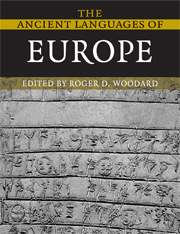Book contents
- Frontmatter
- Contents
- List of figures
- List of tables
- List of maps
- List of contributors
- Notes on numbering and cross-referencing
- List of abbreviations
- Preface
- Preface to the first edition
- 1 Language in ancient Europe: an introduction
- 2 Attic Greek
- 3 Greek dialects
- 4 Latin
- 5 Sabellian languages
- 6 Venetic
- 7 Etruscan
- 8 Continental Celtic
- 9 Gothic
- 10 Ancient Nordic
- Appendix 1 Indo-European
- Appendix 2 Full tables of contents from The Cambridge Encyclopedia of the World's Ancient Languages, and from the other volumes in the paperback series
- Index of general subjects
- Index of grammar and linguistics
- Index of languages
- Index of named linguistic laws and principles
4 - Latin
Published online by Cambridge University Press: 01 September 2010
- Frontmatter
- Contents
- List of figures
- List of tables
- List of maps
- List of contributors
- Notes on numbering and cross-referencing
- List of abbreviations
- Preface
- Preface to the first edition
- 1 Language in ancient Europe: an introduction
- 2 Attic Greek
- 3 Greek dialects
- 4 Latin
- 5 Sabellian languages
- 6 Venetic
- 7 Etruscan
- 8 Continental Celtic
- 9 Gothic
- 10 Ancient Nordic
- Appendix 1 Indo-European
- Appendix 2 Full tables of contents from The Cambridge Encyclopedia of the World's Ancient Languages, and from the other volumes in the paperback series
- Index of general subjects
- Index of grammar and linguistics
- Index of languages
- Index of named linguistic laws and principles
Summary
HISTORICAL AND CULTURAL CONTEXTS
Latin – the language of Ancient Rome – takes its name from Latium, a region encompassing Rome on the west coast of Italy and bordered by the river Tiber to the northwest, the Apennines to the northeast and the Pontine marshes to the south. The Roman antiquarian Varro dated the founding of Rome to 753 BC, but there is archeological evidence for settlement much earlier than this, and it was only later, in the sixth century BC, that Rome became an organized and sophisticated city-state. Latium itself did not achieve political unity until it came under Rome's dominance in the fourth century BC, but the Latini – as the inhabitants of Latium are termed – appear to have shared cultural and religious practice, as well as their language, from well before the period of the first city-states.
The increasing control over Latium was the first stage of Rome's rise to power throughout the Italian peninsula a dominance achieved through conquest, alliance, and colonization. By the second century BC, Rome's military power was great enough to make possible the conquest and annexation of territory outside Italy, including North Africa, Spain, Southern France and Greece. Civil wars throughout much of the first century BC led to the end of the Roman Republic and the foundation of the Roman Empire under Augustus.
- Type
- Chapter
- Information
- The Ancient Languages of Europe , pp. 73 - 95Publisher: Cambridge University PressPrint publication year: 2008



